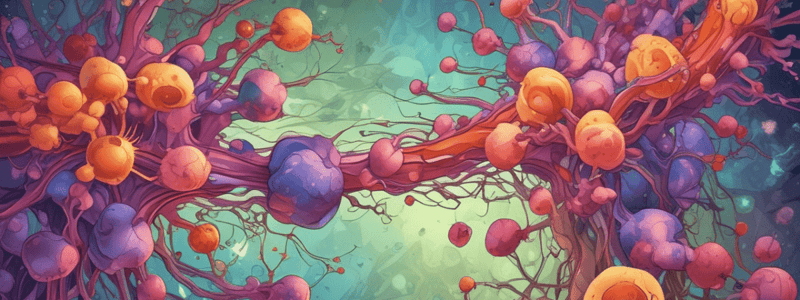Podcast
Questions and Answers
Which cytokine is primarily responsible for inducing fever?
Which cytokine is primarily responsible for inducing fever?
- IL-4
- IL-2
- IL-5
- IL-1 (correct)
Which cell type primarily produces IL-2?
Which cell type primarily produces IL-2?
- B cells
- Th2 cells
- Th1 cells (correct)
- Macrophages
Which cytokine is involved in enhancing the synthesis of IgE?
Which cytokine is involved in enhancing the synthesis of IgE?
- IL-2
- IL-1
- IL-6
- IL-4 (correct)
Which of the following describes an autocrine action of cytokines?
Which of the following describes an autocrine action of cytokines?
What is the primary function of IL-1?
What is the primary function of IL-1?
Which cytokine is produced by both macrophages and Th2 cells?
Which cytokine is produced by both macrophages and Th2 cells?
Which cell type primarily produces IL-6?
Which cell type primarily produces IL-6?
What is one of the functions of IL-12?
What is one of the functions of IL-12?
What is the main role of C5 convertase in the complement system?
What is the main role of C5 convertase in the complement system?
Which type of interferon is produced by Th-1 cells?
Which type of interferon is produced by Th-1 cells?
Which interleukin increases the killing power of phagocytes to tumor cells?
Which interleukin increases the killing power of phagocytes to tumor cells?
What is the primary effect of the lectin pathway in the complement system?
What is the primary effect of the lectin pathway in the complement system?
Which of these is NOT stimulated by IL-6?
Which of these is NOT stimulated by IL-6?
What factor is NOT associated with activation by the complement system?
What factor is NOT associated with activation by the complement system?
Flashcards are hidden until you start studying
Study Notes
Cytokines: Definition and General Properties
- Cytokines are low molecular weight soluble proteins produced in response to antigens, acting as intercellular signals to mediate and regulate immune inflammatory responses.
- Cytokine secretion is a self-limited event (transient).
- One cell can secrete more than one cytokine, and one cytokine can affect more than one cell.
- Many cells can secrete the same cytokine.
- Cytokine function can be targeted at:
- The cells that secrete them (autocrine action)
- Local cells (paracrine action)
- Distant cells (endocrine action)
Important Cytokines and Their Main Activities
IL-1
- Produced mainly by macrophages.
- Acts as an inflammatory mediator in innate immunity, recruiting and activating macrophages and neutrophils at the site of infection.
- Stimulates the hypothalamus, inducing fever (endogenous pyrogen).
IL-2
- Produced mainly by activated Th1 cells.
- Stimulates the proliferation of Th cells and increases cytokine secretion.
- Stimulates the proliferation of B cells and antibody secretion.
- Activates Tc cells and macrophages.
IL-4 and IL-5
- Produced by Th2 cells.
- Promote the growth and differentiation of B cells (B cell growth and differentiation factors).
- IL-4 enhances the synthesis of IgE.
Interleukins
- IL-6:
- Enhances the synthesis of IgA.
- Produced by macrophages.
- Stimulates the production of acute phase proteins by the liver.
- Stimulates the production of neutrophils from bone marrow progenitors.
- Stimulates B cell growth and differentiation.
- Attracts leukocytes to the target site (chemotaxis) and hence is called a chemokine.
- IL-12:
- Produced mainly by Tregs and macrophages.
- Inhibits the production of IL-12, INF-y, and Th1 cells (down-regulates innate SCM).
- Activates NK cells and influences T lymphocytes differentiation.
- Stimulates the activation and recruitment of macrophages and recruits them to the site of infection.
- Increases the killing power of phagocytes to tumor cells.
Interferons
- Interferons are a large family of proteins secreted by most cells of the body.
- Type 1 interferon (IFN alpha) is produced by leukocytes, while IFN beta is produced by fibroblasts, both having antiviral activity.
- Type 1 interferon (IFN gamma) is produced by Th-1 cells, macrophages, and NK cells.
Complement System
- Complement is a complex system of proteins named C1, C2, C3, etc. in the plasma.
- Complement activation occurs in the presence of a pathogen.
- The complement system activates the pathway to produce opsonins and chemotactic factors.
- During activation, a larger protein is designated as an enzyme, and the smaller proteins are chemotactic factors, helping in contacting the pathogen.
- Activation is initially triggered by the complement system.
- The recognition molecule attached to the pathogen activates the complement system.
- C1 is activated, and activated C1 cleaves C2 and C4.
- Then C3, C5 binds to the pathogen to form an attack complex (C5 convertase).
- The attack complex, C5 convertase, breaks down C5.
- The breakdown product of C5, C5a, is a chemotactic factor and activates mast cells, releasing histamine, which further recruits immune cells to the site of infection.
- The attack complex is formed in all cases of infections.
- C5b, C6, C7, C8, C9 bind to the surface of the pathogen and create pores in the cell wall.
- The properdin system bypasses the classical pathway and leads to the formation of membrane attack complexes.
- The lectin pathway is produced by the liver and activates the complement system by binding to pathogen surfaces that trigger complement activation.
Studying That Suits You
Use AI to generate personalized quizzes and flashcards to suit your learning preferences.




